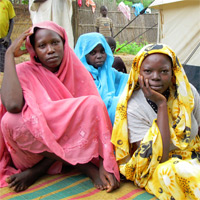
Last month I had the honor of witnessing the birth of the newest country in the world:
the Republic of South Sudan. After a decades-long deadly struggle for freedom, South
Sudanese celebrated for days over the realization of their dream of independent statehood.
The jubilation was tinged with real concerns, however, over the challenges of the
embryonic state of South Sudan and the threat posed by an angry, isolated, and besieged
government of the Republic of Sudan left behind in Khartoum.
It seems to me there are three overwhelming dangers for the Republic of Sudan
posed by partition, accompanied by three related opportunities. First, immediate and
extreme human rights crises in parts of Sudan, particularly the Nuba Mountains, provide
an urgent imperative to exercise the international responsibility to protect civilian
life. Second, growing armed and unarmed internal opposition in Sudan focused on a
real alteration of the status quo provides an opportunity to hone in on fundamental
reforms in governance and how power is shared in that country. And third, the total
failure of existing conflict-resolution processes for the various conflicts in Sudan and
between the two countries offers a major opportunity to alter the mediation paradigm
to focus on a national solution in the North.
South Sudan also has enormous warning signs accompanied by huge opportunities.
The resource curse could become a blessing if transparently managed, and threats from
within and without focusing on ethnic and regional fault lines could be defused with
enlightened power sharing and fundamental democratic reforms.
A new U.S. policy—rooted in the international responsibility to protect civilian
life and democracy promotion—is desperately needed for these two new Sudans.
A number of factors create an enabling environment for a bold change in U.S. and
broader international policy:
- South Sudan’s independence offers an opportunity to press restart in how the United States and the broader international community deal with Khartoum.
- Ivory Coast and Libya demonstrate that the international community is willing to act to protect civilians at extreme risk.
- The support for democratic aspirations in Egypt shows that previously unthinkablechange is possible in that region.
- The Obama administration’s policy shift on Syria shows there is a point where internal repression and human rights abuses require the United States to back away from previous policy.
This is a dynamic time in international relations and should allow for a reexamination
of what is possible in Sudan. The international responsibility to protect civilian life
is making a comeback and aggressive measures must be deployed in response to the
crimes against humanity in the Nuba Mountains. The Arab Spring has opened the door
to sweeping reform that should not leave Sudan untouched. And the stove-piped policy
of mediating individual Sudanese conflicts—marked by continuous accommodation of
the Bashir regime’s international neutrality—has failed the people of Sudan. It’s time to
try something else.

